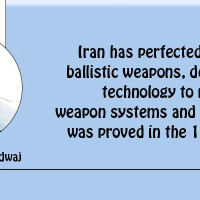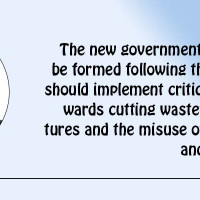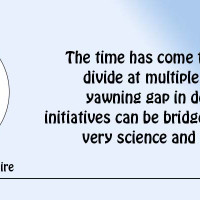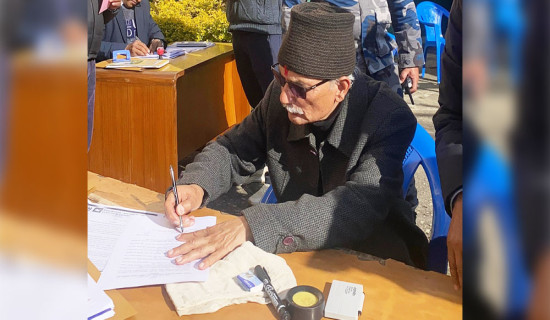- Friday, 23 January 2026
Enhance Quality Of Health Services
Owing to its unique topography and country’s limitation on healthcare spending, Nepal faces numerous challenges in its healthcare sector. One of the key issues is the scarcity of health manpower, which hampers the delivery of quality healthcare services to its population. At the same time, there has been a paradigm shift on disease burden throughout developing countries in recent times as non-communicable diseases becoming the leading cause of morbidity and mortality.
One of the most pressing issues in Nepal's health manpower situation is the severe shortage of healthcare professionals. Nepal's healthcare system is grappling with a severe shortage of skilled healthcare professionals. There is a shortage of healthcare manpower particularly Physician and Pharmacists. The nurse-to-patient ratio is also inadequate, hindering the provision of quality care. The scarcity of health manpower has led to overburdened of already overstretched healthcare facilities, limited access to healthcare services, and compromised patient outcomes.
Consequences
The consequences of this shortage are evident in the limited access to quality healthcare, especially in rural areas, where the majority of the population resides. Another significant challenge faced by Nepal is the brain drain of its healthcare professionals. Many well-trained doctors, pharmacists, nurses, and other healthcare workers choose to migrate to developed countries in search of better opportunities. This brain drain not only worsens the shortage of health manpower but also hampers the country's ability to provide quality healthcare services. Addressing this issue requires a multi-faceted approach, including improving working conditions, providing better incentives, and creating opportunities for professional growth within the country.
The health manpower situation is further complicated by the inadequate infrastructure and limited resources available. Many healthcare facilities lack essential equipment, medicines, and technology, making it challenging for healthcare professionals to deliver effective care. Additionally, the lack of proper infrastructure in rural areas makes it difficult for healthcare workers to reach remote communities, resulting in unequal access to healthcare services. Investing in infrastructure development, particularly in rural areas, is crucial to improving the health manpower situation in Nepal.
A robust health manpower development plan is crucial for Nepal's healthcare system for several reasons. Firstly, an adequate number of healthcare professionals is essential to ensure the availability of quality healthcare services to all citizens, irrespective of their geographical location or socioeconomic status. Secondly, a well-trained and skilled workforce can improve the overall efficiency and effectiveness of healthcare delivery, leading to better health outcomes. Lastly, investing in health manpower development can contribute to economic growth by creating employment opportunities and reducing the burden of disease on the population.
To address the health manpower crisis, Nepal needs comprehensive policy reforms. The government should prioritise healthcare in its national agenda and allocate sufficient funds to improve the health sector. This includes increasing the number of medical and pharmacy colleges, nursing schools, and allied health training institutions to produce more healthcare professionals. Nepal needs to focus on enhancing health education infrastructure, curriculum, and faculty development. Collaborations with international institutions can provide opportunities for knowledge exchange and capacity building.
Additionally, policies should be implemented to encourage healthcare professionals to work in rural areas, such as providing financial incentives, better housing, and career advancement opportunities. Strengthening the regulatory framework and ensuring the quality of healthcare education and training are also essential to produce competent professionals. Continuous professional development programmes should be implemented to ensure that healthcare professionals stay updated with the latest advancements and best practices. This can be achieved through workshops, conferences, and online platforms, encouraging lifelong learning and skill enhancement.
Respective councils should develop plan to keep its members updated with the recent advancement in health science. The majority of Nepal's population resides in rural areas, where access to healthcare is limited. Implementing strategies to attract and retain healthcare professionals in rural areas, such as offering incentives, providing better infrastructure, and improving living conditions, is, therefore, crucial to bridge the overwhelming manpower shortages.
Collaboration
Collaboration between the government and private healthcare institutions can help address the shortage of health manpower. Public-private partnerships can facilitate the training of healthcare professionals, improve healthcare infrastructure, and ensure the availability of quality healthcare services in underserved areas. Nepal's health manpower situation is in dire need of improvement. The shortage of healthcare professionals, brain drain, inadequate infrastructure, and lack of policy reforms are significant challenges that hinder the delivery of quality healthcare services. To address these issues, the government must prioritise healthcare, invest in infrastructure development, and implement comprehensive policy reforms. By doing so, Nepal can overcome its health manpower crisis and ensure better health services to its citizen.
Therefore, a comprehensive health manpower development plan is indispensable for Nepal to overcome the challenges in its healthcare sector. By investing in medical, pharmaceutical, nursing and allied health professional education, enhancing continuing education, developing the rural health workforce, and fostering public-private partnerships, Nepal can build a sustainable healthcare system that ensures equitable access to quality healthcare services for all its citizens. It is high time for the government, healthcare institutions, and stakeholders to prioritise health manpower development and work towards a healthier and prosperous Nepal.
(Dr. Lohani is the clinical director at the Nepal Drug and Poison Information Centre. lohanis@gmail.com)

















